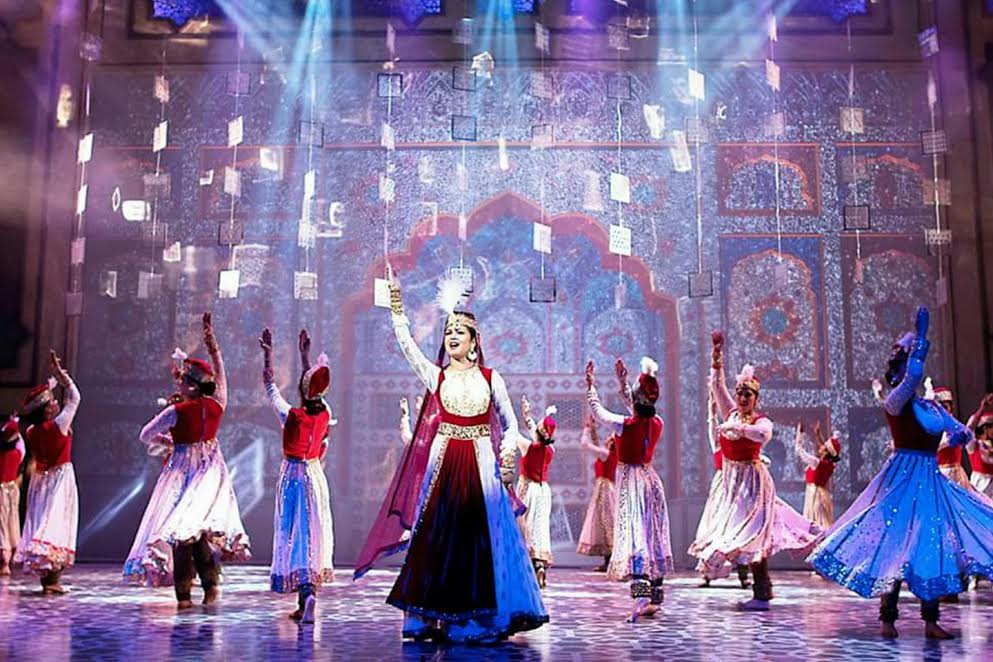
Among the highlights is live singing on stage by female protagonists.
NEW DELHI, February 7, 2018: It is the second season of Mughal-e-Azam’s theatrical run in Delhi, following five successful spells in Mumbai, and the timeless classic continues to pack the crowds.
Little wonder! It tells the enthralling love story of Prince Salim and the courtesan Anarkali — a tale that threatened an empire. It pits son against father, the mighty Mughal ruler Akbar, who by pardoning Anarkali’s life earns the title Mughal-e-Azam (the great Mughal emperor).
The theatrical adaptation is based on K. Asif’s film of the same name, an iconic movie, starring Dilip Kumar, Madhubala and Prithvi Raj Kapoor in lead roles. Interestingly, the film was inspired by a play, ‘Anarkali’, by Imtiaz Ali Taj. So, the wheel has come full circle — back to theater!
At the helm is gifted director Feroz Abbas Khan of ‘Tumhari Amrita’, ‘Mahatma Vs. Gandhi’ fame who leads talented artistes Nissar Khan, Priyanka Barve/Neha Sargam, Sunil Kumar Palwal/Dhanveer Singh, in the lead roles. The play is co-produced by Shapoorji Pallonji (original producers of the film) and the Mumbai-based National Centre for the Performing Arts (NCPA).
READ: Sholay is the best Bollywood film of all time: Time Out poll (March 9, 2015)
It is being staged February 1 to 11 at the spacious Jawaharlal Nehru Stadium and drawing an erudite audience spellbound by the grandeur of the production. Touted as India’s first Broadway musical experience, it is more than that! The immensely gifted artistes displaying their prowess in song and dance, the exquisite costumes by designer Manish Malhotra, the opulent sets, all make for a heady, unforgettable experience.
It is nostalgic for many in the audience who have remained besotted by the cinematic version released many moons ago in 1960. For others, it is an eyeopener to the power and beauty of the performing arts, the uncanny ability of theater to strike an emotional chord with audiences of all ages.
Among the highlights, and there are many, is the live singing on stage. The female protagonists are adept in rendering super hit songs from the movie: ‘Pyaar kiya toh darna kya’; ‘Teri mehfil mein kismat aazma kar hum bhi dekhenge’, among others.
Addressing a press conference, Khan recalled his maiden meeting with Deepesh Salgia, creative head of the 2004 colored version of the film, to obtain the rights. “He actually expanded our imagination”, the director gushed about Salgia. “I had gone to make a more smaller production so that it could be viable. He (Salgia) said for us Mughal-e-Azam is not about money. It is about passion, it is about a vision, it is about a dream. Just make a play that matches up to the original and that makes us very proud”. Khan did just that, and in the process he explored a completely different terrain.
“My instinct is very minimal”, he told journalists referring to his plays, ‘Tumhari Amrita’ and Mahatma Vs. Gandhi’. “There is a very minimalistic approach to it because I feel theater’s own language is so powerful. Here, I was going in a completely different direction”.
About the artistes, he affirmed, they are “the finest that we could find”. They are all from theater, not known names in films or television, he divulged. “This is all live singing so we had to have a very good singer, someone who can sing, dance, looks beautiful, and can act”, he said about the role of Anarkali. “This being a huge production, there are two artistes in the lead roles of Akbar, Anarkali and Salim”, he added.
Khan pointed out that Mayuri Upadhya who choreographed the riveting Kathak dances “has taken this play to a completely different level”. About costume designer Malhota, he noted, “because he comes from a completely different space, he could imagine big”.
The director was delighted that the play is being staged in the capital city. “Delhi is where the entire Mughal era resonates”, he said. “You walk through Delhi and you are walking through history of the Mughal period”.
When queried why it took so long for the play to be staged in the capital, Khan attributed the delay to logistics. “Because we did not get the right venue, it got delayed”, he said. “If we had, we would have immediately come to Delhi. However, Delhi at this point in time does not have a theater that can house a production like Mughal-e-Azam”. So, the team created an entire infrastructure in the JLN Auditorium, “almost like building a theater within a stadium”, Khan said.



